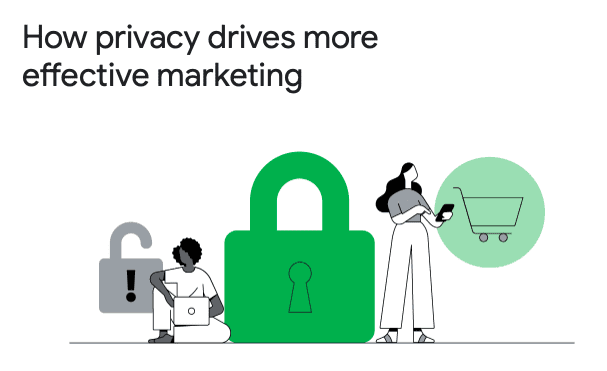Improving online privacy is one of the most important steps marketers can take to boost their brand preference and ensure that nearly half their customers don’t switch to another brand. Research from Google and Ipsos reveals that a remarkable 49% of participants said a positive privacy experience with their second-choice brand would lead them to switch from their first-choice brand.1
The study, involving 16,000 people across Brazil, Canada, Mexico, and the U.S., also revealed how much a negative privacy experience can damage both trust and brand preference.2 As one research participant from Canada said, “I truly want to know exactly what you are doing with my information. Just be straightforward and use plain English.”3
These findings highlight the importance of giving customers a feeling of control over their information — and show how to deliver positive privacy experiences that deliver this feeling effectively.
Help customers feel in control with the three Ms
For customers, feeling in control is about more than just being in control. Privacy tools that allow people to change their cookie preferences and unsubscribe from email marketing can help keep customers in control of their data. But those tools are not enough to provide customers with the more substantial feeling of control that they need to trust a brand. Customers also want to know when and why they are sharing their information — and to understand the benefits they will receive from doing so.

Privacy research we carried out in 2021 provides some insights into how to foster these feelings of control. Drawing on interviews with 7,000 people across five European countries, the research revealed that customers wanted privacy interactions to be:
- Meaningful. Show people what they get in return for sharing their data.
- Memorable. Remind people what data they shared and when.
- Manageable. Provide tools for people to manage their privacy.
Our latest research shows that when brands can deliver these types of interactions, customers find ads more relevant and experience more positive emotional responses.4 As one participant from Mexico explained, when companies offer positive privacy experiences, “I will open messages and read ads with pleasure, because I know they will bring something important to me.”5
Implementing the three Ms
To understand how these findings can be applied in the real world, we devised a series of data privacy practices for marketers to implement that make privacy interactions more meaningful, memorable, and manageable. We then tested them in hypothetical scenarios with customers to see which were most effective.
We found…
Read The Full Article at THINK With Google



